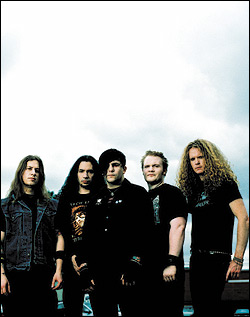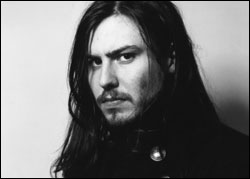AS BAND NAMES GO, “the And/Ors” is snappy and fun. It’s definitely got a je ne sais quoi, like the immeasurable electricity of unopened toys beneath a Christmas tree. How could the And/Ors be anything but a rock and roll Voltron? Their name’s too cool.
The And/Ors
Showbox, Saturday, February 3
For the two-and-a-half-minute duration of “Flexiclocks,” they are exactly that, whirring and squealing as joyously as Willy Wonka’s Gobstopper machine. Surprising, then, that most of their debut LP, Will Self Destruct, (on the Los Angeles label Better Looking) is a cantankerous throwback to the heyday of fuzz pioneers Dinosaur Jr. Surprising, that is, and good.
The And/Ors began as the “bits and pieces of leftover songs” written by Daniel Black, formerly of Interstate 10. For a long time, his backing band alternated between six or seven stopgap musicians and solely his four-track. Only last year did the And/Ors matriculate into a full-scale rock outfit and an indie supergroup at that, with refugees from Jejune, Crash Worship, and Thee Psychic Hearts joining the cause.
The ensemble (guitarist Lane Miller, drummer Chris Wassell, and bassist Arabella “Araby” Makalani) brought the credentials of experience, talent, and dedication as well as that rock intangible—affability.
“This one’s the real deal,” says Black. “These guys are all making big sacrifices [in terms of] day jobs, other bands, how they spend their time, whatever. We hang out together; we listen to records together. We’re all friends, and that’s so refreshing. For a while, I was disillusioned with the idea of having a band. It can be a pain to live a regular life and have a band if you let it.”
AS THE FIRST of the current And/Ors to sign on, Miller (who still plays for the on-hiatus Corrugated) gives bite and attitude to the band’s deceptively familiar guitar crunch.
“Danny is so prolific; he probably wrote six songs today,” marvels Miller. “This is a classic band scenario: He brings ideas to practice, and we all write our parts on our feet. I feel really good about it.”
Much of the buzz-saw garage rock of Will Self Destruct is quite different from earlier incarnations. “As We Play the Tape Tricks Us” was originally half the speed of the feverish version on the record, and the staccato crunch of “Regarding Mr. Right” wasn’t unlike early Cars. At just 52 seconds, the latter is Black’s favorite.
“I could listen to it four times over,” he says, an intriguing comment considering the song’s, ahem, brevity. Not so, asserts Black. “That’s all there was to say. Sometimes there’s no need to repeat yourself.”
On an album that has little tolerance for grandeur and gimmickry, the underwater-sounding finale, “Rockets,” sticks out conspicuously. That is not unintentional; in fact, it gives the clich頢bringing the album full circle” both history and truth.
“That song is classic pre-And/Ors,” relates Miller. “It’s very representative of Danny’s songwriting style back then. It’s just him on a four-track in his room with Araby on backup vocals.”
Harrison, once a strong vocal presence in Jejune, blends well into the background on Will Self Destruct, throwing in Pixies-like bass on “Regarding Mr. Right” and “Neo Disney Hype Trip.” That sort of adjustment is par for the And/Ors’ stunted course.
“Chris had talked to me while we were making this record about not wanting to confuse the listener,” says Black. “That kind of led to us being a loud pop band, just doing things naturally. We’re not trying too hard to be an avant band, so if we put a wacky, dissonant guitar part on top of something, it makes sense. I grew up listening to Sonic Youth and J Mascis. How we play is reflective of what we listen to.”
ALL THE MEMBERS are excited to perform the songs that have metamorphosed so much over two years. After nine months of rehearsals, recording, and very infrequent touring, their patience and exuberance is almost shocking.
“I’m looking forward to about the 10th day [on tour] because that’s when you realize, ‘Hey, it’s not a hassle. We’re actually doing this,'” says Black.
Spontaneity almost has to be a given for an idea to survive as long as the And/Ors have. Black acknowledges that the live show will not be a verbatim reading of the album. These songs, despite finally attaining the permanence inherent with a record, may still be changing.
“There’s always something we can do differently live, a chord conversion here, leaving out a chord there,” says Black. “Some bands get to a place where they’re comfortable, and they do the same thing over and over again. We get to a place where we’re comfortable and try to do something different.”
Lyrically, Black faces a similar challenge—the plainspoken empathy of Will Self Destruct often struggles to be heard above the din.
“People like the Beatles and Tom Petty, they can paint a picture about other people,” says Black. “You really want to know their story. I’m grasping at that; I’m not there yet.”
Most memorable rock and roll storytelling adventures, those of the aforementioned artists included, are epic in terms of content and time; And/Ors songs rarely eclipse three minutes. Problem, right?
“I don’t know,” muses Black. “You can tell somebody a whole lot in three minutes.”







